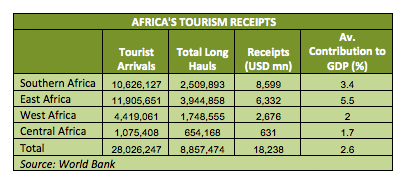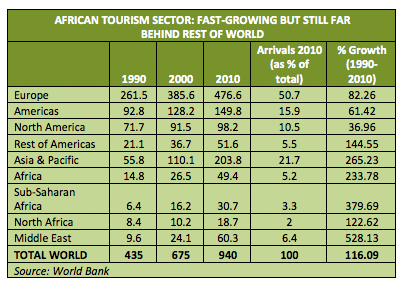Africa's tourism industry could create nearly 4 million new direct jobs in the next 10 years with the right investment and planning policy, according to a new report by the World Bank.
There are major benefits to pursue tourism as a key sector for African countries. Many of the countries offer breathtaking scenery, great wildlife and treasure trove of archeological, historical and cultural heritage that are unique to the continent.
"Africa's mountains, savannahs and rivers, and cultural events such as music, dance and festivals are far above the natural assets found in other regions," says Iain Christie, one of the report's co-authors. "With these natural attributes, tourism can play an enormous role in development. But to do so it must be integrated into each country's economy and government structure and be seen as a benefit by everyone, from the president, to the ministers to the general population."
Despite the sheer breadth of Africa riches and areas to explore, the continent remains the least visited (with the exception of Antarctica, of course) in the world.
But it's also the fastest growing tourism destination in the world over the past two decades, albeit from a much lower base.
Within Sub-Saharan Africa, Eastern Africa has proven to be the most popular, with Southern Africa not far behind.

In East Africa, Mozambique and Kenya attract 30% of the tourists to the region, while South Africa is the dominant destination in southern Africa. In West Africa, Senegal and Nigeria together account for 78% of visitors to the region.
The value of tourism to SSA economies varies widely. In 2011, tourism contributed 2.7% directly to the GDP of SSA countries, compared with 4.3% of GDP in Southeast Asia, 4.4% in the Caribbean, and 3% in the Middle East, the bank says.
"However, average regional figures fail to show the high level of dependence some countries have on tourism. For example, in the Seychelles, tourism activities account for 44% of GDP and in Mauritius tourism contributes 16% to GDP."
East Africa is also most dependent on tourism as the sector contributes 5.5% to its GDP, while 3.4% of southern Africa's GDP depends on the industry.
However, tourism's contribution to the GDP of West Africa (2%) and Central Africa (1.7%) shows that those regions have barely scratched the surface of their potential.
CREATING EMPLOYMENT
More than 5.3 million people are currently employed in Sub-Saharan Africa's tourism sector and that figure could grow exponentially. Travel and tourism touches all sectors of the economy, tourism's total direct and indirect employment impact in SSA is 12.8 million jobs, the bank said.
"By 2022, the WTTC [World Travel and Tourism Council] forecasts 6.8 million direct jobs in tourism in SSA and more than 16 million people are expected to be employed directly and indirectly through tourism, but to generate the potential new jobs that are forecast in tourism, investment in SSA needs to grow." 
The bank outlines 10 key reasons for African countries to focus on the development of the tourism industry.
These are:
1. TRANSFORMING POTENTIAL
Plane-loads of tourists can really help in boosting a country's economy. Their propensity to spend money on retail, consumer goods, restaurants etc. means they can have an impact on many sectors of the economy.
While tourism has an immediate and direct impact on the economy, its multiplier effect is even more compelling.
International tourists spent USD 339 billion in emerging economies in 2010, but their combined direct, indirect and induced impact was even greater at USD 6.3 trillion, the United Nations World Tourism Organization said.
2. JOBS
Tourism generates more bang for an investor's buck. Industry estimates show a USD 250,000 investment in Zambia's tourism sector will create 182 full-time jobs - 40% higher than if the same investment was made in agriculture and 50% more than in mining.
3. REMOTE ACCESS
Tourism development can help remote areas get funding and investments, which would improve the livelihoods of residents and get them gainful employment.
4. REFORM-INDUCING
Tourism can help raise SME development and stimulate foreign investment.
"In Cape Verde, tourism took off when the banking sector was reformed, when the escudo was pegged to the euro, and when an attractive package of investment incentives was created, the bank said. "In Rwanda, significant improvements in 'doing business' indicators were linked to the desire to increase gorilla tourism."
5. INFRASTRUCTURE DEVELOPMENT
Hosting an event like the 2010 FIFA World Cup provided South Africa the incentive to invest USD 2.6 billion in infrastructure. Major events, including conferences and festivals often lead to faster development of roads, hotels, communications and transportation infrastructure such as airports.
6. INCREASE IN DOMESTIC CONSUMPTION
A developed and robust tourism sector can generate revenues for sectors as diverse as real estate, communications, financing and retail. It can also boost export services.
7. EMPOWERING THE MARGINALIZED
Tourism can help raise the standard of living of women and young people in emerging economies.
A UNWTO study noted that women outnumber men in certain positions in the tourism sector, and account for 31% of the sector. It is also one of the few sectors where women can expect equal pay. In addition, it can also be a great way to employ young people.
"By engaging young people in productive employment, tourism can provide an alternative to out-migration, urban poverty, and armed conflict," the bank said.
8. HERITAGE RESTORATION
A thriving tourism sector will ensure that government's divert funds to cultural heritages, monuments and places of interest that would otherwise be neglected.
9. PRIVATE SECTOR PARTICIPATION
The sector also allows the private sector and foreign investors to participate in the economy of the country. Hospitality investors can bring funds, skills and managerial expertise that could be transferred to the local population. They can also be a source of tax revenues and can contribute to conservation efforts, infrastructure development and investment promotion
10. NATIONAL PRIDE
As Egyptians can testify, tourism can play a huge role in showcasing a country's cultural heritage. Egyptians take great pride in the pyramids and associated ancient assets that are unique in the world.
Tourism can help transform a country's image in the eyes of the world, and has already helped countries like Rwanda and Mozambique, both of which were once considered war-torn, but are now known for their gorillas and sandy beaches, respectively.
© alifarabia.com 2013




















